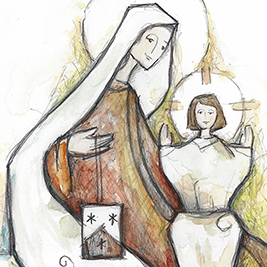A homily for the 26th Sunday in Ordinary Time
When the Carmelites first came to the United States, they settled in Kansas of all places, because there was a big German speaking community, and they took new vocations. But the new vocations were Americans. A lot of them were like Irish American, and they spoke a different language, English is a different food. They had different customs, they had different mannerisms.
And the Germans were starting to get outvoted, outnumbered. So one night all the Germans left the community, taking the sacristy, taking the money box, taking the library, and they just disappear, leaving all the English speakers to wake up in the morning. Where did everybody go? Where is everything? And the Germans settled in Texas. Where there was a German speaking community, last for quite a few years.
But then all of a sudden a big drought and Texas had everyone left, leaving the Carmelites there. They had nothing to do, no flock anymore. They came back to Kansas, of all things, ironically. You know, to bother heads and return. Some of them wouldn’t. And they went to Vienna, some of them because they spoke German and founded the Carmelite house in Vienna.
And I mentioned this because it’s that disparity, you know, when there’s a difference, when people get outvoted or outnumbered or outclassed or outgunned or outspent, and then there’s disparity and then there’s unhappiness and I think we see that in today’s gospel where we have Lazarus, who’s poor, the dogs are licking his wounds. He lives in the street.
And then we have the rich man in this parable who doesn’t even see that Lazarus is there. And when they both die, that gulf continues and gap continues. And the rich man still doesn’t even see Lazarus. Just orders Abraham to tell Lazarus, bring me some water. And I think that we have to keep that in mind always. That when there’s a difference, when things start to move more and more and more and more and more and more vertical, it gets out of hand.
People are unhappy. Reform is due. In St. Teresa’s time she became a nun in a convent called incarnation, where noble women could have, be nuns, but bring their servants, bring their food, and poor ones lived like in a closet. And so when she reformed, she said, no, all will be equal. And her famous line is, “in this house, all are friends, all are load, all are helped, all our held dear”.
She’s taking this great vertical situation in incarnate Incarnation convent and making it horizontal. And I think that’s the warning of today’s gospel. And I think it’s the warning of today’s society where the rich get richer and richer. I hear Microsoft is hiring some new employees at $100 million a year. It’s like the rich man. And where are, are we the Lazarus. We’ve got to be careful because this is where things start to fall apart. Just like in today’s parable, we’ve always got to to be working to keep things horizontal. I think Teresa of Avila taught that. I think that’s what Jesus is preaching about, that in this house, all are friends, all are loved, all are helped, all are held dear.
Let’s hope that is always the case.



